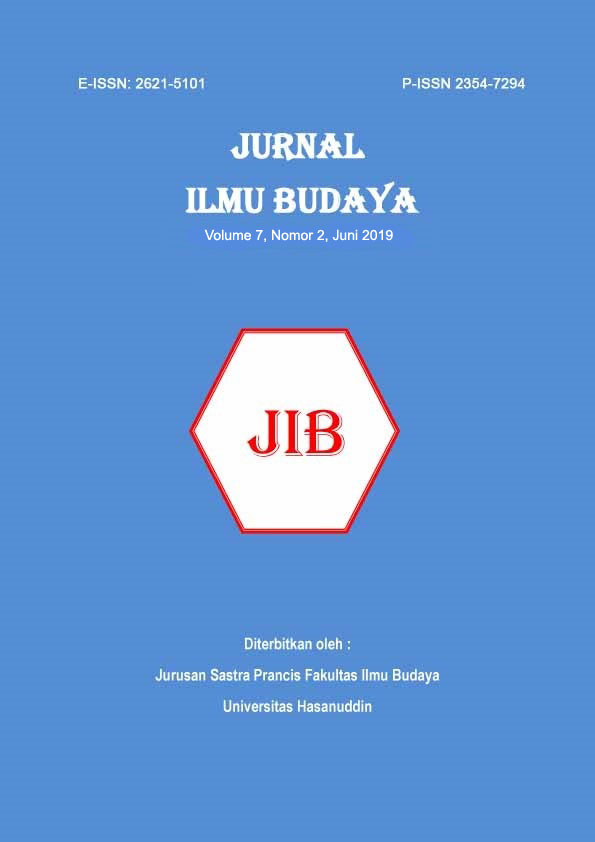KEARIFAN EKOLOGIS DALAM LEKSIKON BAHASA RIMBA DI HUTAN BUKIT DUABELAS JAMBI: KAJIAN EKOLINGUISTIK
DOI:
https://doi.org/10.34050/jib.v7i1.6368Keywords:
Ecological Wisdoms, Lexicon, Jungle Language, EcolinguisticsAbstract
This study aims to explain the forms of ecological wisdom in the lexicon of jungle language regarding forest ecosystems, subsistence fulfillment, and naming and interpreting flora and fauna. This research was a qualitative research. The research data were in the form of the jungle lexicon related to forest ecosystems, subsistence, flora and fauna. Data were obtained from the Jungle people gathered in Ketemenggungan Makekal Hulu. Data were collected using ethnographic interviewing techniques, participant observation, and the application of ecolinguistic knowledge in praxis. The data analysis technique used in this study refered to the principle of the ethnographic method proposed by Spradley (2006), namely the research data that had been obtained through interviews and participant observation was coded so that the data source can still be traced. Then the data inside contained some local terms in the language of the jungle lexicon being transliterated. Furthermore, data were classified and analyzed based on ecolinguistic theory. After that, the data were presented in the form of in-depth descriptions and conclusions based on the results of the study. The discussions of the results of this study outlines three problems based on the formulation of the problem, namely (1) forms of ecological wisdom in the Jungle language lexicon relating to forest ecosystems including: changes in weather and disasters, about types of rain, time according to jungle people, rivers and regulation, and the classification and treatment of forest areas; (2) forms of ecological wisdom in the jungle lexicon that are related to subsistence fulfillment, namely behuma ‘farming’, beburu ‘hunting’, gathering (collecting forest product); and (3) the forms of ecological wisdom in the lexicon of the jungle language, which relates to the naming and meaning of flora and fauna, out of the fifteen flora described the origin of their names and meanings, seven of which have no scientific names yet, as well as the fifteen outlined, eleven of them have also not been identified.Downloads
References
Bellwood, P. 2000. Prasejarah Kepulauan Indo-Malaysia Edisi Revisi. Jakarta: Gramedia Pustaka Utama.
Fill, A. dan Mühlhäusler. 2001. The Ecolinguistics Reader Language, Ecology and Environment. London and New York: Continum.
Gising, B. 2010. Kearifan Ekologis Tu Kajang Dalam Pengelolaan Hutan Adat Lestari Di Wilayah Adat Kajang Kabupaten Bulukumba. Disertasi. Makassar: Universitas Hasanuddin.
Inglis, J. T. 1993. Traditional Ecological Knowledge Concepts And Cases. Ottawa: IDRC.
Majid, A. Wahab & Umarrudin. 1993. Hubungan Hukum Adat Dengan Status Tanah Dan Hutan Bagi Masyarakat Suku Anak Dalam Provinsi Jambi. Makalah Seminar. Lembaga Adat Provinsi Jambi.
Majid, A. Wahab dan Umarrudin. 1993. Hubungan Hukum Adat Dengan Status Tanah dan Hutan Bagi Masyarakat Suku Anak Dalam Provinsi Jambi. Makalah Seminar. Lembaga Adat Provinsi Jambi.
Prasetijo, A. 2011. Serah Jajah dan Perlawanan yang Tersisah Etnografi Orang Rimba. Jakarta: Penerbit Wedatama Widya Sastra.
Rokhdian, D. 2012. Alim Rajo Disembah Piado Alim Rajo Disanggah: Ragam Bentuk Perlawanan Orang Rimba Makekal Hulu. Tesis. Depok: Universitas Indonesia.
Spradley, J. P. 2006. Metode Etnografi. Yogyakarta: Tri Wacana.
Usman, M. 2010. Etnoekologi Linguistik (Ekolinguistik) Suatu Paradigma Pengembangan Terpadu Bahasa, Pengetahuan, dan Lingkungan. Pidato Pengukuhan Guru Besar. Makassar: Universitas Hasanuddin.
Downloads
Published
Issue
Section
License
Copyright (c) 2019 JURNAL ILMU BUDAYA

This work is licensed under a Creative Commons Attribution-NonCommercial 4.0 International License.







